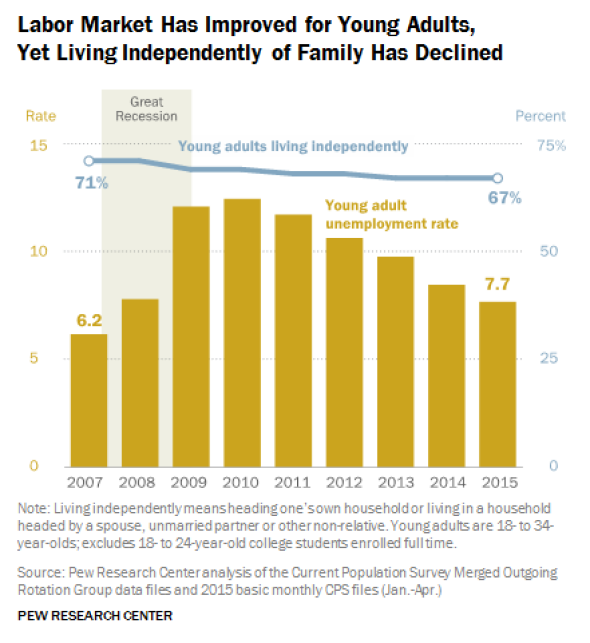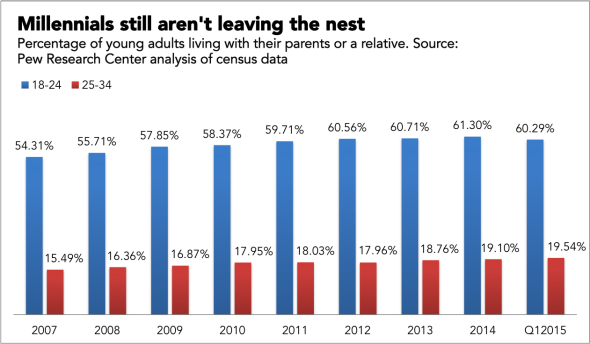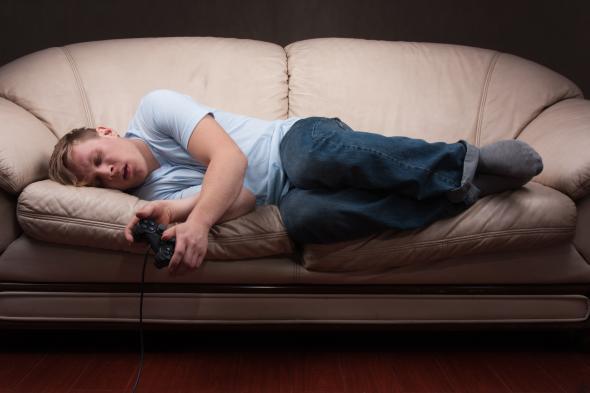Earlier this spring, there seemed to be signs that young adults were finally shaking off the effects of our long-ago recession and moving out from their parents’ basements. Namely, the pace of U.S. household formation was speeding up, which is generally a sign that twentysomethings are setting off on their own.
But maybe not so much. Today, the Pew Research Center is out with a new analysis of census data suggesting that young adults haven’t really changed their ways. The job market might be getting better by the month, but millennials are still very much living at home.
First, the very big picture. Since 2010, unemployment among 18-to-34-year-olds has fallen significantly. And yet the fraction of that group living independently, meaning not with a parent or relative, has also declined.

Now let’s drill down a little more. Pew was kind enough to send me its numbers broken down into smaller age groups—18-to-24-year-olds (with full-time college students excluded) and 25-to-34-year-olds. In the first three months of 2015, it seems, the percentage of younger millennials living at home shrank a bit. For older millennials, it rose. Pew cautions that, because of seasonal issues, numbers from this past winter might not be 100 percent comparable with full-year data from 2014. But still, there’s no real sign that the 25-to-34 group is leaving the nest.

Jordan Weissmann*
And honestly, nobody is entirely sure why they haven’t yet. There are theories, of course. Some studies have blamed student debt, though that doesn’t really explain why non-college-goers are also living at home at higher rates. Others suggest the fact that young people now get married later than they used to may be responsible. To me, it seems blindingly obvious that the fact that rents are rising faster than wages in much of the country has something to do with it, though I haven’t seen a rigorous analysis testing that theory. (But, seriously, 46 percent of 25-to-34-year-olds were rent-burdened in 2013, up from 40 percent in 2003. If it is less affordable to get an apartment, it seems unsurprising that fewer people will do it.)
Really, though, it’s kind of silly to try and single out a single overriding reason why millennials are still fulfilling our stereotype as the boomerang generation. The labor market might not be a raging dumpster fire anymore. But over the past 15 years, the economy (and culture) has evolved in ways that make living solo less appealing. The rent is high. We have education loans to pay off. We’re not in a rush to get hitched. So long as all that stays true, America’s basements are probably going to stay pretty full.
Correction, July 29, 2015: About a minute after publishing, I noticed a spreadsheet error that inflated the percentage of 25-to-34-year-olds living at home. Thankfully, it did not change the underlying trend or analysis at all, but I deeply regret my Reinhart-Rogoff moment. I’ve swapped in a corrected graph.
